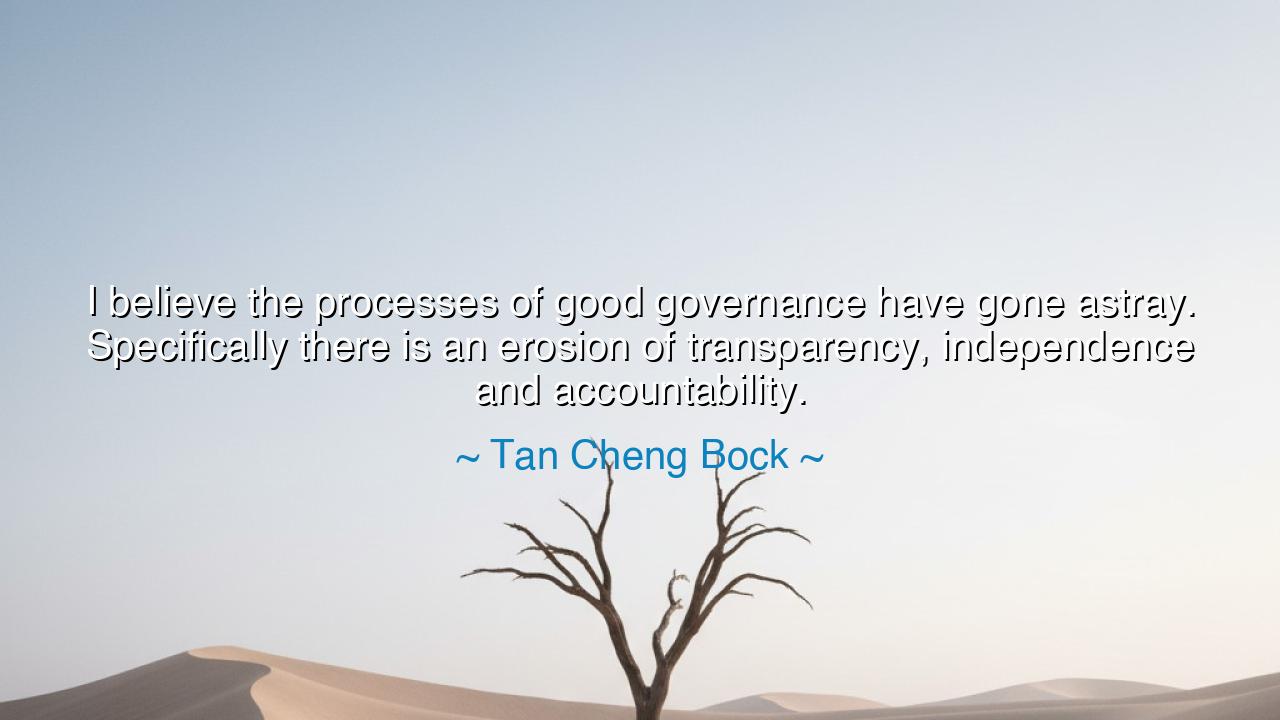
I believe the processes of good governance have gone astray.
I believe the processes of good governance have gone astray. Specifically there is an erosion of transparency, independence and accountability.






Hear now the solemn words of Tan Cheng Bock, elder statesman and physician of the civic soul: “I believe the processes of good governance have gone astray. Specifically there is an erosion of transparency, independence and accountability.” These words, simple yet grave, strike like the tolling of a bell — a call to awaken, a warning to remember. For in every age and every land, the health of a nation depends not only on its wealth or power, but on the integrity of its governance. When these sacred principles — transparency, independence, and accountability — begin to fade, it is as though cracks form in the foundation of a great temple. The walls may still stand for a time, but within, the strength begins to crumble.
The ancients understood that good governance is the heartbeat of civilization. The philosopher-kings of old were judged not by their splendor, but by their justice; not by their might, but by their fairness. Tan Cheng Bock, who served his people with both compassion and courage, speaks from the wisdom of one who has seen the shifting of political tides. His lament is not born of rebellion, but of devotion — a devotion to the moral fabric that binds leaders to those they serve. When he says that governance has gone astray, he does not mean chaos has yet arrived, but that the compass of truth has begun to waver. And when the compass falters, even the mightiest ship can lose its course.
Transparency — this is the first pillar that he names. It is the light that keeps the house of power from turning into a chamber of shadows. Without it, rumors replace reason, suspicion replaces faith. The rulers of ancient Athens, mindful of this truth, held their debates in open forums so that every citizen might see the workings of law. They knew that sunlight was the guardian of honesty. But when secrecy takes root, corruption blooms unseen, and truth is buried under the weight of silence. So too in modern governance: when decisions are made behind veiled doors, the people grow blind, and blind nations walk toward peril.
Next he speaks of independence — that sacred virtue of the state and of the soul. A government without independence is a body without breath. It cannot stand firm against the pressure of self-interest, nor can it defend justice from the grasp of those who would twist it for gain. History bears witness to this. In the days of the Roman Republic, judges and senators were once bound to the people, their offices protected by law from the whims of emperors. But when ambition devoured independence, when loyalty to truth was replaced by loyalty to power, the republic fell into tyranny. The same lesson whispers to every generation: where independence dies, freedom soon follows.
The third pillar, accountability, is the bond between ruler and ruled, the sacred promise that no hand is above the law. In ancient China, the sage Confucius taught that the virtue of a ruler must mirror the virtue of heaven — constant, just, and answerable to the harmony of the world. When leaders forget this, they become not shepherds of the people but masters over them. To hold power is not to possess privilege, but to bear the burden of example. Without accountability, power becomes like water without banks — it floods, it drowns, it destroys.
The erosion that Tan Cheng Bock speaks of is not sudden; it is slow, like the wearing away of stone by years of careless rain. It begins with small compromises — a truth left unspoken, a question unanswered, a duty neglected. Over time, these small cracks widen, and soon the very notion of responsibility fades. But the wise see the danger before the fall. Tan’s warning is not a cry of despair, but a plea for renewal — a reminder that governance, like health, must be examined, mended, and guarded before it collapses beyond repair.
O listener, take this wisdom to heart. Whether you govern a nation, a company, or your own household, let transparency be your light, independence your strength, and accountability your conscience. Do not fear scrutiny, for it is the test that proves integrity. Do not cling to control, for true strength lies in service. And do not grow silent when truth falters, for silence in the face of decay is itself a form of betrayal. Every citizen is a keeper of their country’s virtue; every generation must renew the vows of good governance.
Thus, let the words of Tan Cheng Bock endure like an inscription on the pillars of time: When transparency dims, independence weakens; when independence falters, accountability vanishes; and when accountability dies, liberty itself is lost. Guard these virtues as the ancients guarded fire — feed them, tend them, and pass them on. For in their light alone can a nation see the path of justice, and in their strength alone can it remain truly free.






AAdministratorAdministrator
Welcome, honored guests. Please leave a comment, we will respond soon